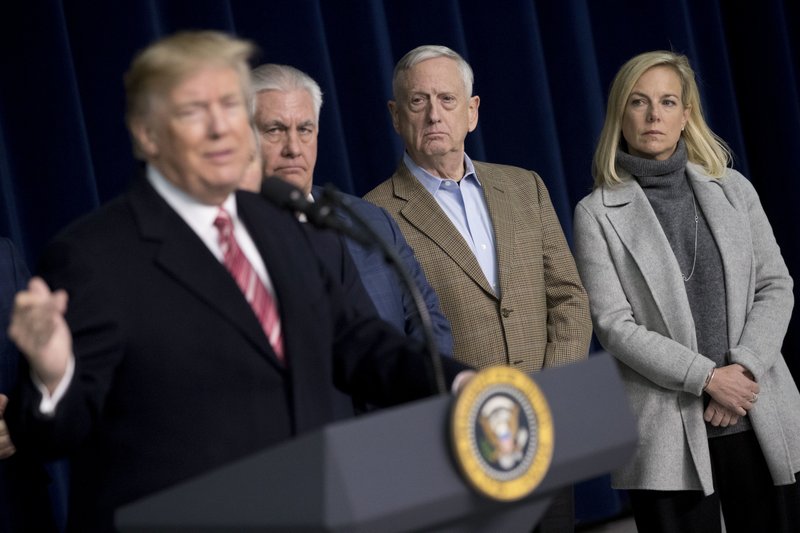THURMONT, Md. -- President Donald Trump on Saturday said he remains open to direct talks with North Korea's regime over its nuclear program and added that he hopes the rogue Asian nation participates in the Winter Olympics to be held in South Korea next month.
"Sure, I always believe in talking," Trump said Saturday at Camp David in Maryland. "Absolutely, I would do that; I wouldn't have a problem with that at all."
But he was quick to add that any dialogue or direct conversation with North Korean dictator Kim Jong Un would come with conditions, which he did not specify.
The first formal talks between North and South in more than two years are set to take place in a border town Tuesday as the rivals try to find ways to cooperate on the Winter Olympics and to improve their ties. Tensions are high because of the North's nuclear and missile programs.
[NUCLEAR NORTH KOREA: Maps, data on country’s nuclear program]
"Right now they're talking Olympics. It's a start; it's a big start," Trump said during a question-and-answer session after holding meetings with GOP leaders in Congress and with Cabinet members on the administration's 2018 legislative agenda.
Assessing this week's discussions between the two Koreas, Trump said: "If something can happen and something can come out of those talks, that would be a great thing for all of humanity. That would be a great thing for the world."
The president said he had spoken with South Korean President Moon Jae-in, who "thanks me very much for my tough stance."
"You have to have a certain attitude and you have to be prepared to do certain things, and I'm totally prepared to do that," Trump said, though he added that his talk of being willing to use military force against the North "is not a stance; it's what has to be done, if it has to be done."
The president contended that his tough words have helped persuade the North to sit down with the South. The two Koreas agreed to talks about the Olympics and other issues after their officials spoke through a secure communications hotline.
Trump had tweeted last week: "Does anybody really believe that talks and dialogue would be going on between North and South Korea right now if I wasn't firm, strong and willing to commit our total 'might' against the North?"
Kim "knows I'm not messing around. I'm not messing around, not even a little bit, not even 1 percent. He understands that," Trump said.
Moon, who was elected in May, campaigned on greater engagement with North Korea after both hard-line and more accommodating approaches toward Pyongyang have failed over the years. When Kim used his New Year's address to offer direct talks with Seoul, Moon quickly accepted. Previously, the Trump administration had said that Kim must abandon or at least pause his nuclear weapons program before talks would be considered.
During his time as president, Trump has sometimes threatened North Korea and sometimes offered to talk. Last spring, he said he'd be open to talks, but he shifted course after North Korea continued its nuclear and ballistic missile tests and after Otto Warmbier, an American college student, died several days after his release from 17 months in captivity in the North. At one point in October, Trump chided Secretary of State Rex Tillerson on Twitter for "wasting his time" by pursuing diplomacy with North Korea.
After Kim boasted about having a button on his desk at the ready to launch a nuclear weapon at the U.S., Trump replied on Twitter that his nuclear button is "much bigger & more powerful" than Kim's.
Trump's shift in tone and his support for talks between the Koreas drew praise on Saturday.
"These are constructive comments by the president," Nicholas Burns, a former undersecretary of state in President George W. Bush's administration who's now a professor at the Harvard Kennedy School of Government, said of Saturday's news conference. "It is essential that we remain united with Seoul and not permit Kim Jong Un to divide us."
Burns also supported Tillerson, who said Friday on CNN that "any talks with the North should have as their aim denuclearization by the North."
Trump, who in a talk with Moon agreed to halt joint military exercises through the Olympics, said of the North that he would "like to see them get involved in the Olympics and things will go from there. ... I'd love to see them take it beyond the Olympics."
The Olympics will be held in Pyeongchang, which is about 50 miles from the heavily fortified border between the two Koreas.
Trump and Moon agreed Thursday to delay the joint military exercises, long a source of consternation to the North. China is also troubled by the large annual military exercises and has proposed a "dual suspension" formula for talks in which the U.S. would suspend the drills in exchange for North Korea suspending its nuclear development.
However, Defense Secretary James Mattis said the U.S. move was not a political gesture, but rather was a practical necessity to accommodate the Olympics. The annual military exercises with South Korea will resume sometime after the Paralympic Games conclude March 18, Mattis said.
North Korea and South Korea remain technically at war because the fighting in the 1950-53 Korean War ended with an armistice and not a peace treaty. More than 30,000 U.S. troops are stationed in South Korea as a deterrent against the conflict's resumption.
Information for this article was contributed by Jill Colvin of The Associated Press; by David Nakamura of The Washington Post; and by Margaret Talev and Bill Allison of Bloomberg News.
A Section on 01/07/2018
